Top Benefits of Using Bespoke Software for Your Business
Bespoke software is a custom solution tailored for your business’s unique needs. Unlike off-the-shelf options, it offers superior flexibility and efficiency. In this article, we delve into the main benefits of bespoke software for businesses.
Key Takeaways
-
Bespoke software provides high levels of customization, scalability, and enhanced security tailored to meet the unique needs of businesses.
-
Choosing bespoke solutions over off-the-shelf software can lead to long-term cost savings through improved efficiency and a better fit for evolving business processes.
-
Effective project management and stakeholder engagement are critical for the successful implementation of bespoke software, ensuring alignment with business goals and user expectations.
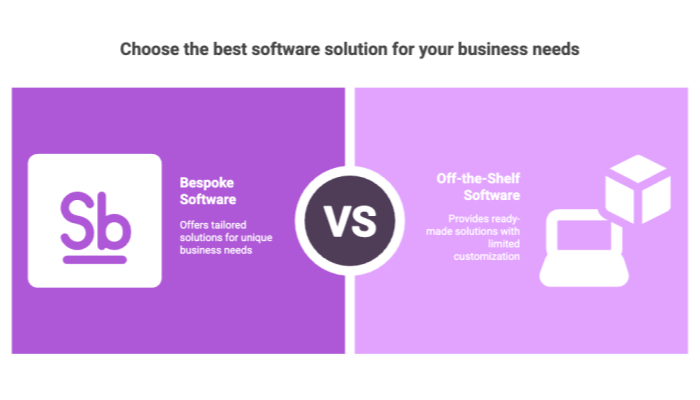

What is Bespoke Software?
Bespoke software is tailored to meet the specific needs of a business or organization. These solutions are custom-built for unique requirements. Unlike off-the-shelf software, which is created for a mass market, bespoke software solutions are developed to meet the precise needs of a single customer or a specific user group. This high level of customization ensures that the software aligns perfectly with a business’s operational needs and provides unique functionalities that standard solutions cannot offer.
One of the standout unique features of bespoke software is its scalability and flexibility. As market demands and business needs evolve, bespoke software can be adjusted and expanded to incorporate new functionalities and support growth. This adaptability makes it a future-proof investment, capable of evolving alongside your business.
Moreover, bespoke software ensures ownership of the source code and comes with enhanced security features. This level of control and protection is crucial in today’s digital world, where data breaches and cyber threats are rampant. By choosing a bespoke solution, businesses can mitigate these risks and maintain a competitive advantage.
Bespoke software is akin to a bespoke suit; it fits perfectly, looks great, and serves its purpose exceptionally well. It’s a strategic investment that aligns with your business objectives, providing a solid foundation for growth and success with tailor made software.
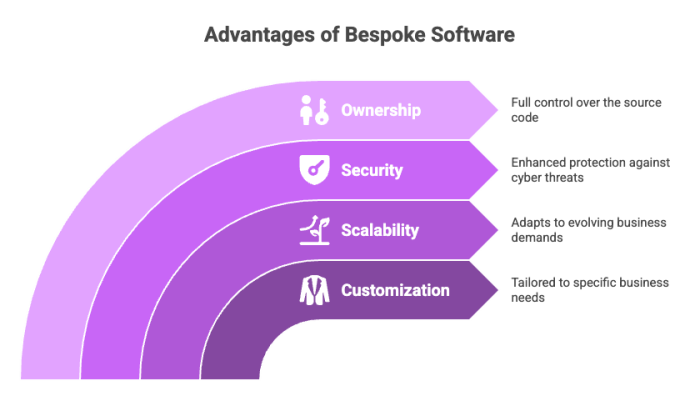

Comparing Bespoke Software and Off-the-Shelf Solutions
When it comes to choosing software solutions, businesses often find themselves at a crossroads: should they opt for bespoke software solutions or off-the-shelf products? Understanding the key differences between these options is crucial for making an informed decision.
Bespoke software is highly customizable, allowing businesses to tailor functionalities to their specific requirements. This contrasts sharply with off-the-shelf software, which caters to a broader audience and may include unnecessary features that are irrelevant to your business. While bespoke software solutions entail higher upfront development costs compared to off-the-shelf solutions, they often provide long-term savings through greater efficiency and a better fit.
Scalability is another significant advantage of bespoke software. Designed to support rapid growth, bespoke solutions can easily adapt to new business processes and market demands. On the other hand, off-the-shelf solutions might suffer from limitations in features or support, hindering your business’s ability to scale effectively.
Grasping the pros and cons of bespoke and off-the-shelf solutions enables businesses to make strategic software decisions. While off-the-shelf software can be a quick and cost-effective pre packaged solution for immediate needs, an off the shelf package of bespoke software offers a tailored approach that can significantly enhance operational efficiency and long-term success.
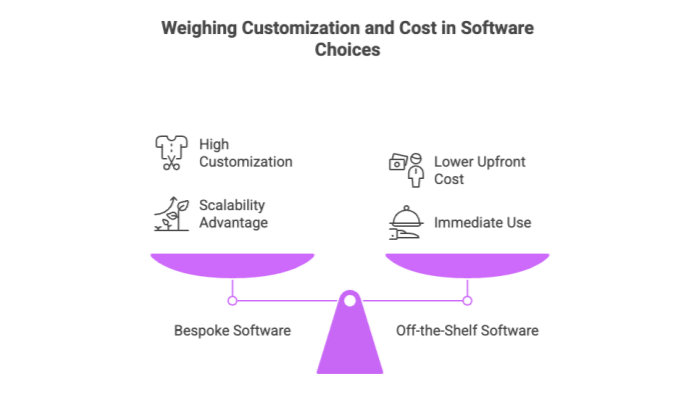

Benefits of Bespoke Software Solutions
Investing in bespoke software solutions often yields quick returns by enhancing operational efficiency. Custom-built software is designed to fit the specific workflows and requirements of your business, streamlining processes and automate repetitive tasks. This leads to significant productivity gains, allowing your team to focus on more strategic activities.
The adaptability of bespoke software is another major benefit. As your business grows and evolves, the software can be modified to incorporate new features and address emerging needs. This flexibility ensures that your software remains relevant and continues to support your business objectives over time.
Security is a critical concern for businesses, and bespoke software typically offers superior protection. Since it is developed exclusively for your organization, the risk of vulnerabilities that are common in widely-used off-the-shelf software is significantly reduced. This enhanced security can give your business a distinct competitive advantage, allowing you to operate with greater confidence and peace of mind.
Bespoke software solutions offer unique tools and capabilities that foster innovation and long-term success. Whether you’re looking to improve customer satisfaction, streamline processes, or gain a competitive edge, when you choose bespoke software, it can be the key to unlocking new potentials.
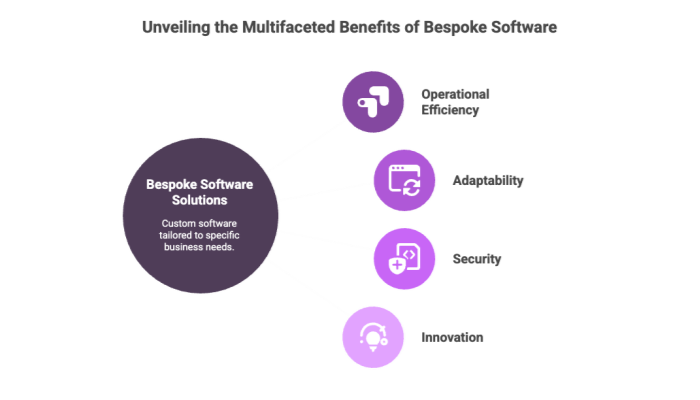

Challenges and Considerations of Bespoke Software Development
While the benefits of bespoke software are compelling, it’s important to consider the challenges and potential obstacles involved in custom software development. One of the primary concerns for businesses is the high initial cost of developing bespoke solutions. Estimating development costs can be challenging due to the many factors that contribute to the total expense, leading to potentially inaccurate early projections.
Effective project management is crucial to the success of bespoke software projects. Poor management can lead to delays and budget overruns, negatively impacting the project’s outcome. Additionally, unclear or frequently changing project requirements can significantly hinder progress, with 39% of software projects failing due to these issues.
Continuous communication within the development team is vital for ensuring that the project stays on track and helps the team stay ahead. A lack of communication is cited as a major cause of project failure by 86% of employees. Moreover, quality assurance and regular maintenance are essential to ensure high performance and security for your bespoke software.
Finally, planning for ongoing support post-launch is crucial. Addressing any issues promptly and enhancing the user experience can make a significant difference in the success of your bespoke software solution. Despite these challenges, with careful planning and execution, bespoke software can provide substantial long-term benefits.
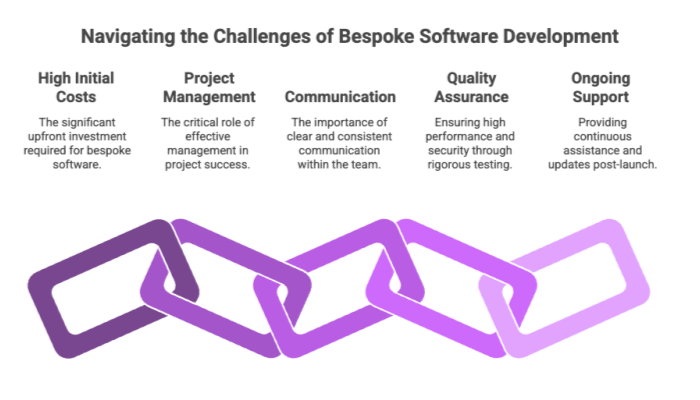

How to Determine if Your Business Needs Bespoke Software?
Determining whether your business needs bespoke software involves evaluating your current and future requirements. One clear indication is if your business has unique needs that off-the-shelf solutions cannot adequately address. Bespoke software evolves alongside your business, adapting to the needs of the business and scaling for growth.
Custom software allows for ongoing modifications, ensuring that your custom made software solution continues to align with your business’s evolving needs. In contrast, off-the-shelf products may not adapt easily, leading to potential integration issues with existing systems. We provide custom made solutions tailored to your specific requirements, including commercial software options.
By assessing your business’s specific requirements and considering the limitations of off-the-shelf solutions, you can determine whether investing in bespoke software is the right choice. Tailored software solutions can provide the flexibility and scalability needed to support your business objectives and drive long-term success with tailored solutions.
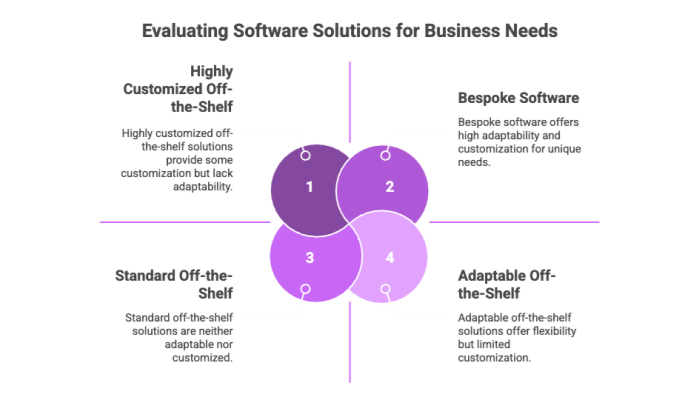

Examples of Successful Bespoke Software Projects
Several well-known companies have successfully implemented bespoke software solutions to enhance their business processes and efficiency. For instance, Airbnb developed a custom CRM system that streamlines communication between hosts and travelers, enhancing user engagement through automated messaging and tailored recommendations. This bespoke solution has significantly improved the user experience and operational efficiency.
Another example is TechCrunch, which utilizes a custom CMS to simplify content management. This system allows multiple authors to collaborate on articles simultaneously without technical barriers, enhancing productivity and streamlining the publication process compared to other systems.
WillDom’s WAVE platform is a custom HRMS that leverages AI for smarter hiring and onboarding processes. This bespoke software solution has improved talent management and operational efficiency, demonstrating the significant impact of tailored software on business success.
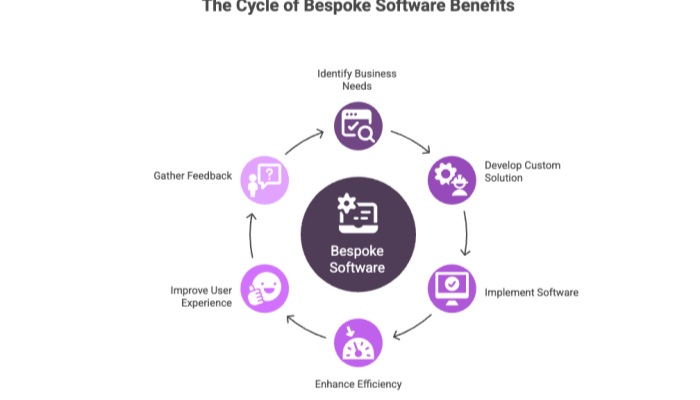

In-House vs. Outsourcing Bespoke Software Development
When it comes to bespoke software development, businesses must decide between building software internally (in-house) or contracting an external company (outsourcing). Each approach has its pros and cons, and the right choice depends on your business’s specific needs and resources.
In-house development involves building software within your company, providing complete oversight and control over the process. However, managing an in-house team can lead to challenges with scaling resources quickly in response to project demands. Additionally, it requires a significant initial investment for hiring, training, and infrastructure to develop.
Outsourcing, on the other hand, provides access to a larger talent pool, enabling the hiring of specialized skills that may not be locally available. This approach can lead to cost savings by eliminating expenses related to salaries and benefits for an in-house team. However, there are potential drawbacks, such as security risks when handling sensitive data and inconsistencies in service quality due to varying standards across different providers, highlighting the advantages and disadvantages of this strategy.
By weighing the pros and cons of each approach, businesses can determine the best strategy for their bespoke software projects. Both in-house development and outsourcing have their merits, and the right choice will depend on your business’s unique needs and circumstances.
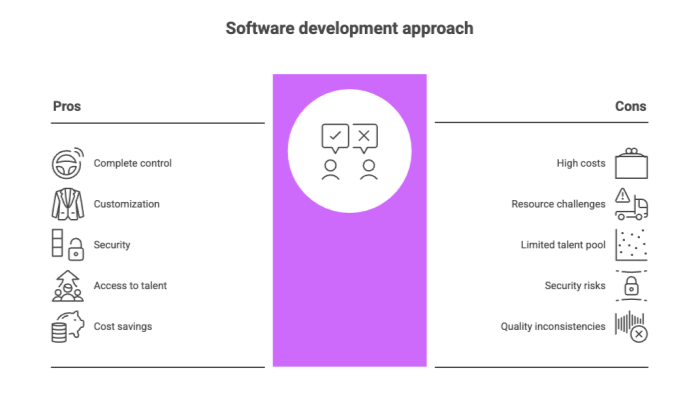

The Role of No-Code Tools in Bespoke Software Development
No-code platforms have revolutionized the landscape of bespoke software development by enabling users to create software applications without writing a single line of code. These tools utilize pre-built modules and features, facilitating rapid prototyping and drastically shortening the time needed to bring new applications to market.
One of the key benefits of no-code platforms is their ability to allow for quick iterations and validations of core software concepts. This enables rapid feedback and development, ensuring that the final product aligns with user needs and expectations. However, no-code applications are typically limited in customization and may not support complex workflows.
While no-code platforms accelerate development and reduce dependency on specialized developers, they may fall short in handling highly customized applications. Despite these limitations, no-code tools play a valuable role in the development process, particularly for rapid prototyping and validation.
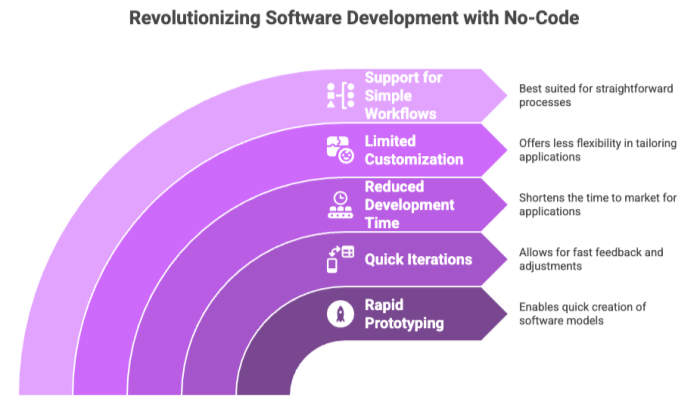

Conducting a Thorough Cost-Benefit Analysis for Bespoke Software
Conducting a thorough cost-benefit analysis is essential for evaluating whether the advantages of bespoke software justify the initial costs involved. This analysis helps assess long-term benefits versus the initial investment, providing a clear picture of the financial viability of a bespoke software project.
The long-term costs of off-the-shelf solutions can exceed their higher initial cost due to licensing, maintenance, and upgrade fees, leading to both cost and higher costs over time. In contrast, bespoke software is typically owned by the business that commissions it, eliminating ongoing licensing costs. The analysis should identify total costs, including ongoing maintenance and potential enhancements, which are crucial for long-term financial planning.
Both tangible and intangible factors, such as efficiency improvements and competitive advantages, should be considered in a cost-benefit analysis. Calculating metrics like return on investment (ROI) and payback period is vital for assessing the financial viability of a bespoke software project.
Regular updates and refinements to the cost-benefit analysis ensure its relevance and accuracy in guiding decision-making. By thoroughly evaluating the costs and benefits, businesses can make informed decisions about investing in bespoke software solutions.
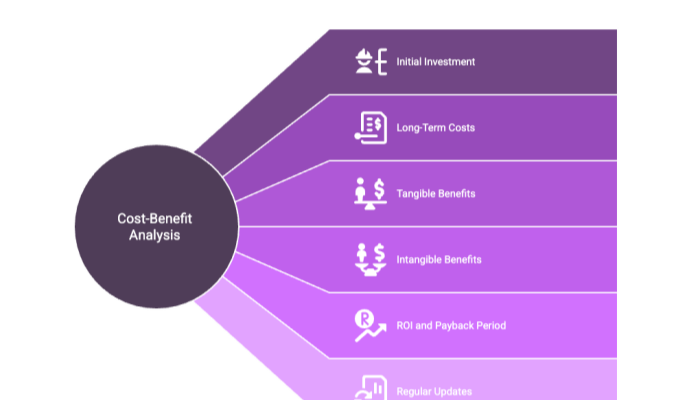

Key Factors for Successful Bespoke Software Implementation
Successful bespoke software implementation hinges on several key factors. Effective project management is crucial for mitigating risks and ensuring a successful outcome. Defining clear objectives from the beginning helps align the software development process with business goals, providing a roadmap for the project.
Engaging stakeholders throughout the initial stages of the development process ensures that their insights shape the software’s functionality. This engagement fosters a sense of ownership and satisfaction among users, leading to a more successful implementation. Regular feedback during development allows for real-time adjustments, ensuring that the final product meets user expectations.
In-house development offers complete oversight and control, facilitating immediate communication and support for quick issue resolution. No-code platforms also enhance collaboration by enabling non-technical team members to participate in the software development process.
By focusing on these key factors, businesses can ensure a smooth and successful implementation of their bespoke software solutions, ultimately driving operational efficiency and achieving their business objectives and business requirements. This principle applies to all aspects of software development and business models.

Summary
Bespoke software solutions offer a pathway to enhanced operational efficiency, productivity, and a competitive edge. By aligning with your business’s unique needs, bespoke software can streamline processes, improve user experience, and support long-term success. However, it’s important to consider the challenges involved, such as high initial costs and the need for effective project management.
Conducting a thorough cost-benefit analysis, engaging stakeholders, and focusing on clear objectives are crucial for successful implementation. Whether you choose in-house development or outsourcing, the right approach depends on your business’s specific requirements and resources.
In conclusion, bespoke software is a strategic investment that can drive business growth and innovation. By understanding the benefits and considerations, businesses can make informed decisions and leverage bespoke solutions to stay ahead in the competitive market.

Frequently Asked Questions
To help you better understand bespoke software and its impact on your business, we've compiled answers to some of the most common questions. Whether you're curious about its benefits, development options, or practical applications, this FAQ section provides clear and concise insights.
What is bespoke software?
Bespoke software is a custom-built solution tailored to the specific needs of a business, delivering unique functionalities that standard software cannot offer. This approach ensures that the software fits perfectly with the organization's requirements.
What are the main benefits of bespoke software solutions?
Bespoke software solutions significantly enhance operational efficiency, productivity, and scalability while providing greater security and a competitive edge. They also adapt to evolving business needs, effectively streamlining processes.
What are some examples of successful bespoke software projects?
Successful bespoke software projects include Airbnb's custom CRM system, TechCrunch's custom CMS, and WillDom's WAVE platform, all of which have greatly enhanced operational efficiency and business processes.
Should I develop bespoke software in-house or outsource it?
It is advisable to choose the option that aligns with your business's specific needs and resources; in-house development affords better control, whereas outsourcing can leverage specialized skills and reduce costs. Assess your priorities to make an informed decision.
How do no-code tools fit into bespoke software development?
No-code tools are instrumental in the bespoke software development landscape as they facilitate rapid prototyping and quick iterations of core concepts. While they may not replace highly customized solutions, their role in validation and agility is invaluable.

